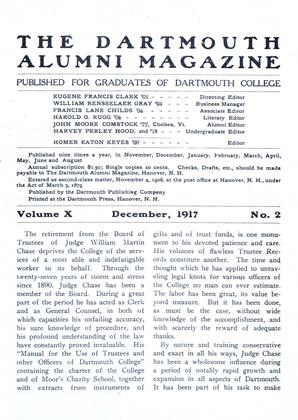One feature of this fall has been the fraternity situation in Hanover Until this year, with a few exceptions, it had been the general custom to pledge freshmen immediately after matriculation. But this fall, in view of the unsettled conditions and the desire on the part of certain fraternities to look over their prospective pledges more carefully, six fraternities, Psi Upsilon, Alpha Delta Phi, Delta Kappa Epsilon, Theta Delta Chi, Sigma Chi, and Phi Gamma Delta, decided to extend no invitations until December 8. The system is being watched with some interest as it represents a distinct split on the "pledging" idea.
Another departure from established custom was the idea of open slates in class elections, advocated and put through by The Dartmouth. This publication's viewpoint on the matter of elections, in this case freshman, was that "deals" were bound to exist in a class election, no matter what steps might be taken to prevent them. It therefore advocated that any combinations formed be made public. About one-half of the freshman candidates, numbering some 30 in all, advertised in The Dartmouth, and for the next two issues the sheet was full of such alluring terms as "The Man Who Made the Campus Restaurant Famous—Vote for Him." The election itself was given a great deal of publicity by Palaeopitus through an electric signboard and a general good feeling was aroused in the class. The men elected were for the most part those who had refused to advertise, but the idea brought out much discussion of elections in general and was distinctly a worthwhile experiment. The freshmen chosen for office were: W. B. Miller, president; G. B. Harris, Jr., vice-president; F. A. Ross, Jr., secretary; R. W. Elsasser, treasurer; F. K. Robeson, College Club representative.
 View Full Issue
View Full Issue
More From This Issue
-
 Article
ArticleCOLLEGE NEWS
December 1917 -
 Article
ArticleOCTOBER MEETING OF THE TRUSTEES—EXTRACTS FROM THE MINUTES
December 1917 -
 Article
ArticleTHE AMERICAN UNIVERSITY UNION IN PARIS
December 1917 By Homer Eaton Keyes, '00 -
 Article
ArticleFROM A TRAINING CAMP IN FRANCE
December 1917 -
 Article
ArticleThe retirement from the Board of Trustees of Judge William Martin
December 1917 -
 Article
ArticleMINUTES OF THE MEETING OF THE COUNCIL OF THE ALUMNI OF DARTMOUTH COLLEGE
December 1917 By HOMER EATON KEYES







